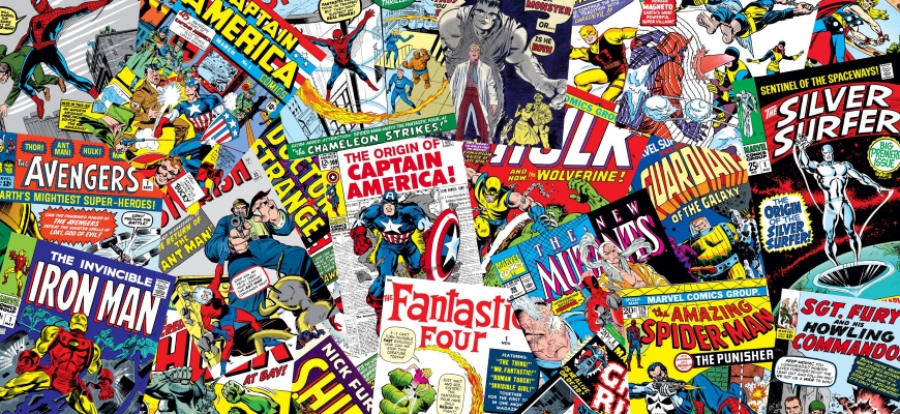Using this definition, it could easily be determined that the current generation is in fact ‘Generation Geek’:
- 7 of the 10 highest-grossing film franchises since 2000 are sci-fi, comic book or fantasy based.
- The global video game industry is worth over $101 billion.
- 92% of teenagers are online daily and 24% would say they are online constantly.
But what does this mean for teaching and learning?
For me it means a great opportunity, as it means that I can bring some of my favourite geek culture into my classroom, as well as try out new and exciting technologies to support learning.
Teaching social sciences (in particular Sociology, Psychology and PSHE) means that I often have to teach some quite abstract concepts and ideas, and using TV / film clips helps to embed these ideas for the students. The days of films and TV only having a place in English lessons or at the end of term are waning. These forms of media offer a wealth of opportunity to put concepts and ideas into context, which then helps students to remember and apply them. It also gives me the opportunity to introduce the students to some of my favourite cult TV shows, films and franchises.
One example is in year 11 PSHE. As part of the sex and relationship education (SRE) programme we talk a lot about relationships and the identification of non-physical abuse which can often be mistaken for love. To demonstrate this, I use clips and quotes from the Twilight series of books and movies. The relationship between Bella and Edward hits 8 out of the 10 criteria for abusive relationship; thankfully not physical or sexual abuse, but there are plenty of examples of emotional and psychological abuse.
These include:
- Destructive criticism and verbal abuse: shouting / mocking / accusing / name calling / verbally threatening…
- “Bella, it’s not my fault if you are exceptionally unobservant.”
- “Don’t be offended, but you seem to be one of those people who just attract accidents like a magnet. So try not to fall into the ocean or get run over or anything, all right?”
- “Must I always be the responsible one?”
Harassment: following you; checking up on you; checking to see who has phoned you; embarrassing you in public…
- Breaking into her house to watch her sleep without her permission (before they’ve even started dating), following her…
- “I followed you back to Port Angeles,” he admitted, speaking in a rush. “I’ve never tried to keep a specific person alive before, and it’s much more troublesome than I would have believed. But that’s probably just because it’s you.”
Threats: making angry gestures; using physical size to intimidate; shouting you down; breaking things; punching walls…
- He lowered the automatic window and leaned toward me across the seat. “Get in, Bella.” I didn’t answer. I was mentally calculating my chances of reaching the truck before he could catch me. I had to admit, they weren’t good. ‘I’ll just drag you back,’ he threatened, guessing my plan.”
Being able to put these criteria into context for the students makes it a little more real and shows that abuse is not just physical or sexual.
Other areas of PSHE open themselves just as much to the use of TV and film. I recently found a film on Netflix called Into the Dark, in which a group of students who are about to graduate from an American international high school in Jakarta spend their"The days of films and TV only having a place in English lessons or at the end of term are waning." final philosophy lesson discussing various Gedanken Experiments, in particular the Armageddon Experiment. I used this film to create a scheme of work for Year 9 or 10 looking at moral thinking. Specific clips were used to introduce the experiments and discuss the choices made by the film’s students, before getting my own students to make their choices.
In Psychology there are many TV shows and films that have a psychological theme to them: Criminal Minds, Perception and Lie To Me to name just a few. I have used all of these at one time or another in my psychology lessons to help show various abstract ideas. For example, I have used Perception in conjunction with Criminal Minds to illustrate how schizophrenia manifests itself differently in different people. There is also an episode of Blood Ties, a Canadian vampire crime show, which discusses Freud’s tripartite personality and has the added bonus of having a final scare which always makes students jump and me laugh.
Last academic year saw two major films come out that fit directly into the AQA psychology specification: The Experimenter with Peter Sarsgaard and Winona Ryder, which chronicles Stanley Milgram’s study of Obedience, and The Stanford Prison Experiment with Billy Crudup taking the role of Dr Philip Zimbardo. Both of these studies are a core part of the A Level Psychology syllabus. I used both in my teaching, but as a form of holiday homework where the students watched one of the films and then compared it to their own knowledge of the study. This allowed particularly the visual learners to see the study in practice further embedding it to memory.
Sociology offers a great way to get superheroes into lessons. I have used the representation of women in the comic book world and the lack of female-led superhero movies (until next year with Wonder Woman – eeek!) to discuss gender roles and the representation of women in the media. For example, Lois Lane in the Batman universe consistently plays the role of damsel in distress, often to the detriment of the bigger picture. This was particularly true in the recent Batman V Superman movie where (spoiler alert) Superman leaves the fight against Doomsday to rescue Lois from drowning, caused by her own misadventure.
It is not just the social sciences that lend themselves to the use of film and TV. In history I used A Knight’s Tale in an activity to help students understand the idea of anachronisms. The idea being that they had to hold up a red card any time they spotted an anachronism in the film clip I showed. I have used episodes of Band of Brothers when teaching about the holocaust and WWII again to bring the topic to life. This example is particularly good, as at the start and end of each episode the surviving members of 101st Airborne are interviewed again putting the situation into context.
Geekiness isn’t just about TV and films, as stated in the definition, but also includes use of the Internet and technology in day-to-day life. I am in no way a tech-head but I do like to play around with innovative ideas, especially when I can utilise them in my classroom. Technology and, in particular, social media have become a huge part of students’ lives. This can be to the advantage of the teacher.
In the last academic year, I found that using email to communicate with my students was not very effective. Students rarely checked their school email, yet my lessons were often interrupted with beeps or vibrations from phones receiving a tweet or message (despite my constant reminder to have them on silent"I used this film to create a scheme of work for Year 9 or 10 looking at moral thinking." or turned off). With this in mind I created a department Twitter account (@wymcolsocsci) which allowed me to communicate more effectively with my students. Messages and reminders can be sent out regarding the lessons, links to wider reading or documentaries can be sent out as well as useful information. This is not a new thing and I am a little late coming to party (took a while to convince the department to do it), but it has been effective so far.
Students also seem to prefer to find information from the Internet rather than the more traditional textbook. This is partly due to accessibility, it is easier and lighter to carry around a tablet or a phone then it is a great big book. My school gives out textbooks to all our students, however I also remind them that the books are available as an ebook. I also created a revision blog for A Level Sociology so that students would be able to access the resources at any time (as well as save my department photocopying costs) both in the lessons and as part of prep for the lessons. This may not sound particularly geeky, but fits into the definition nonetheless.
I am a self-professed geeky-teacher and I wouldn’t have it any other way. Being able to bring together my subject passions as well as my geeky passions can make for some very memorable lessons and discussions, which in turn can help to raise achievement.
How do you teach geek? Let us know below!


















